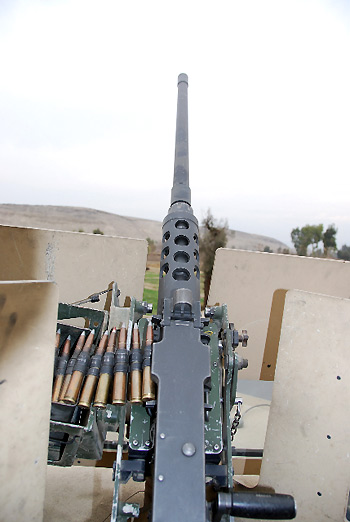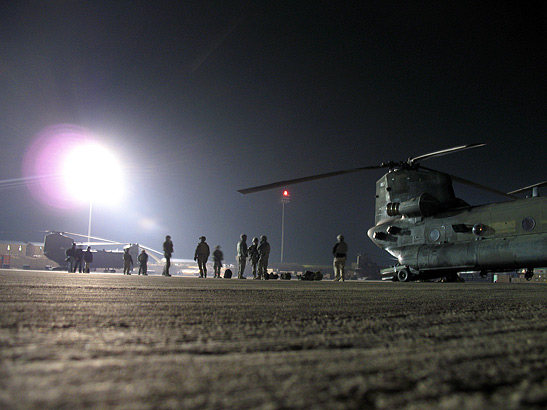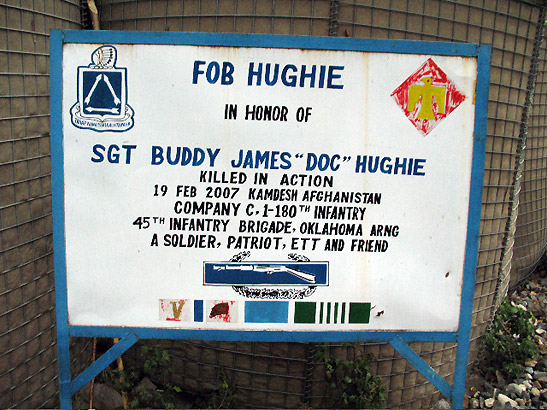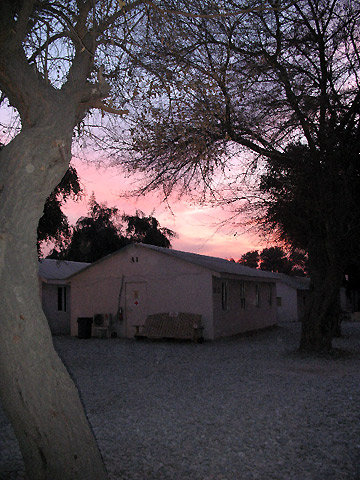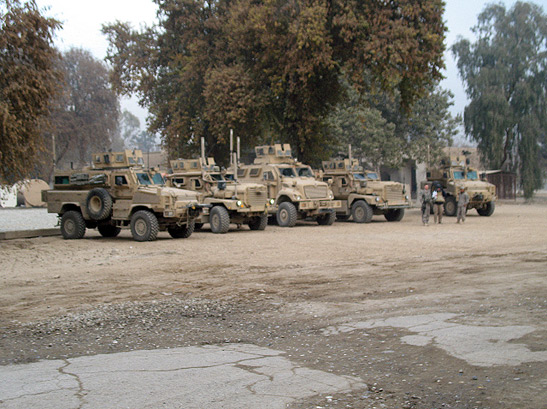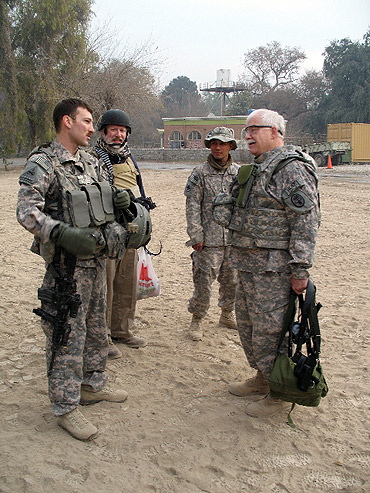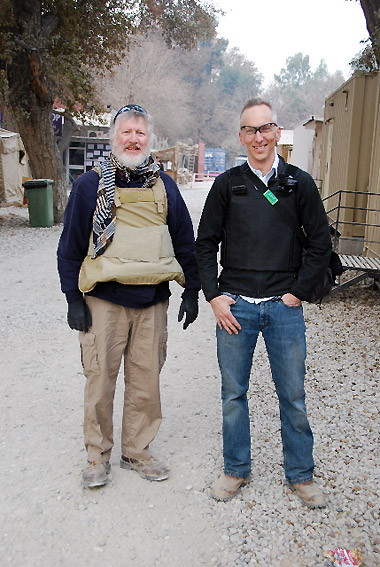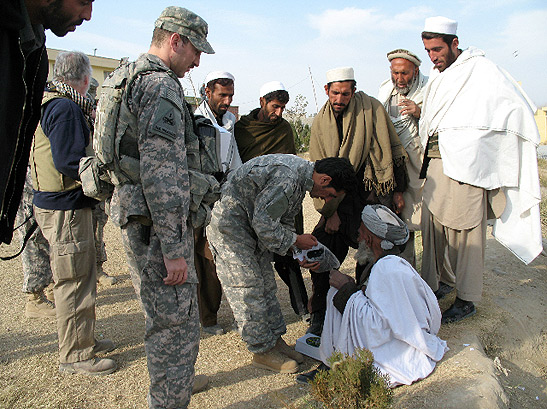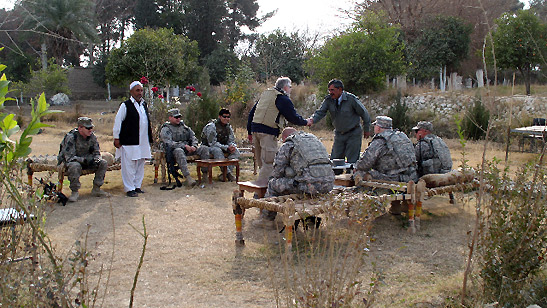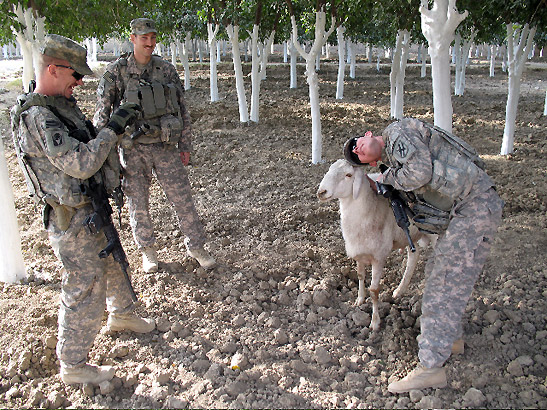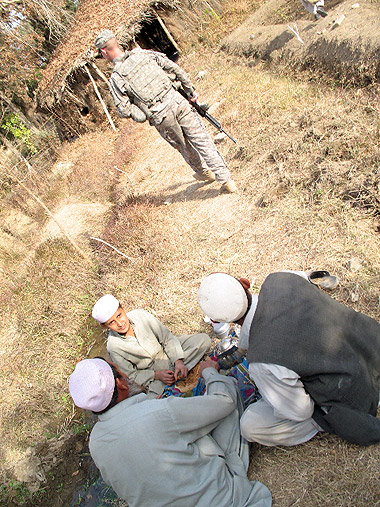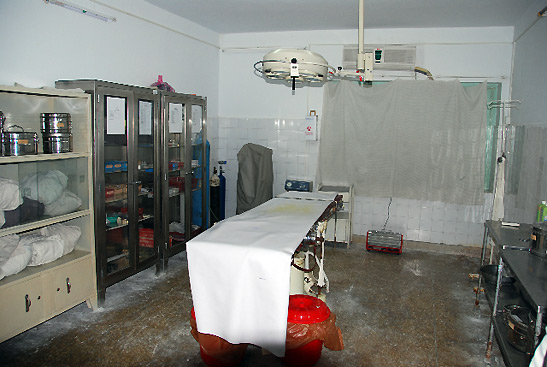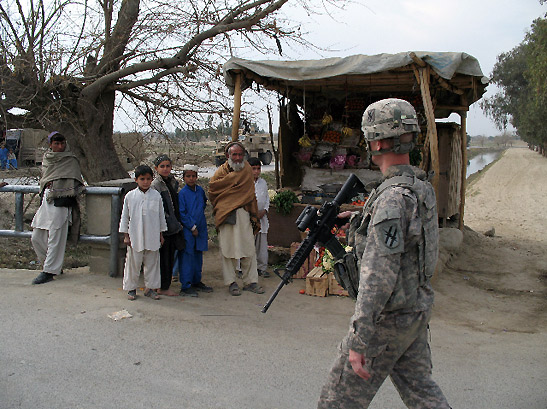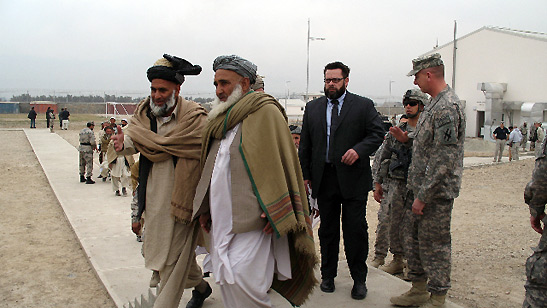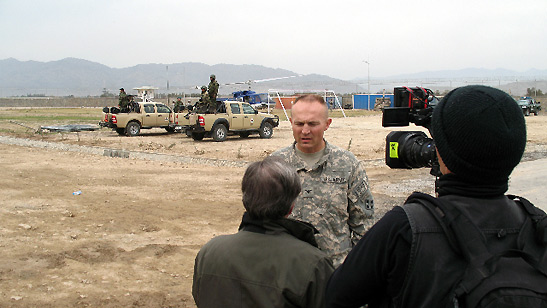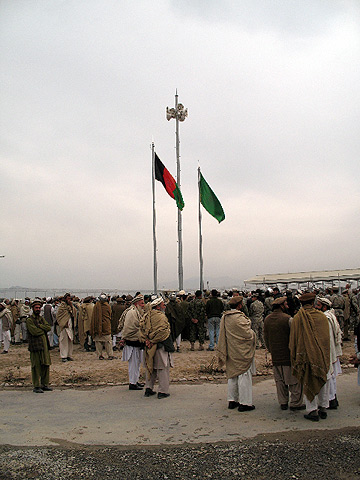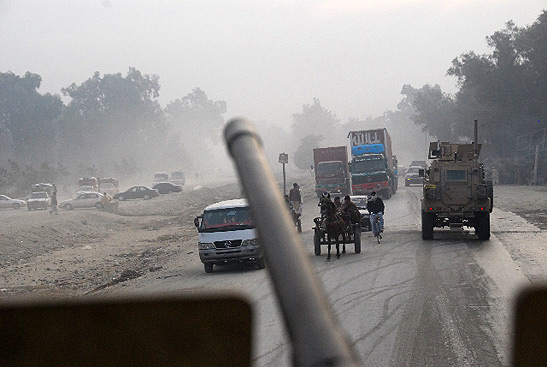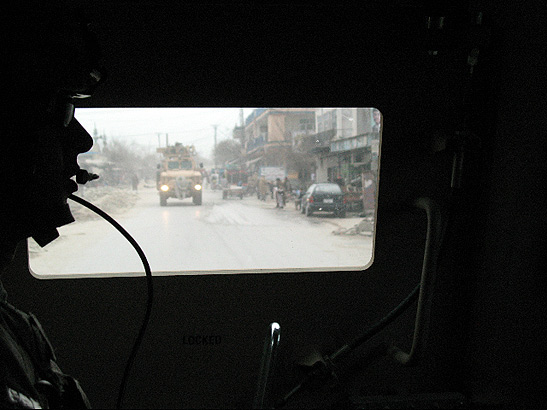 |
 |
|
 |
|
The Kingdom of Dirt By Jim Friend
Including layovers, it took about 35 hours to get to Kabul. An interesting thing about going to Afghanistan is that if you don't mind not being under the protection of the military, you don't have to have any special approval to roll over there, you can just go. You'd think if you were going to a war zone, you'd have to get some sort of government sanction or stamp of approval, but no. And it's relatively cheap. Only $1,800 currently separates you from being headhunted in the streets of Kabul three weeks from now if that's what you want. You can buy the tickets tomorrow. Although difficult to find, some ticket agencies (like kayak), will book the whole round trip flight for you. You're just one simple click of a button away from being a war tourist. C'mon dude, let's roll. Buy me a ticket along with yours and I'll show you around.
After a really interesting couple of days in Kabul, complete with a rather major Taliban assault on several buildings within a mile or so of my hotel the day before I arrived (check the travelingboy archive for that story), I finally made it to Bagram Air Base. Other than the occasional mortar round and constant threat of terrorist attack, life at Bagram seemed rather idyllic. By my estimation in my brief time there, the 22,000 folks working on base generally seemed to be rather stoked. There's even a pizza delivery service if you want it. After a few days of delays in Bagram, I was finally off to Jalalabad via a night flight on a Chinook. The automatic gunfire from the side-door and rear gunner half-way through the ride under the warm light of a nearly full moon didn't hurt the experience at all either. Way cool. The next morning I was picked up by an MRAP and was finally off to Camp Hughie. It took nine days and five flights to get there from Seattle. Outskirts of Hell Camp Hughie is a tiny droplet of America that leaked from the screaming fire hose of US military might onto the outskirts of the ghetto dust bowl slum that is Jalalabad. Jalalabad, or J-bad, as the soldiers call it, is a place barely distinguishable from what your mind would conjure up when thinking about an Old Testament heathen village. This is a place where people still collect manure to hand-slap into pancake sized crap patties, place them on their roofs to dry, and then light them up to cook and heat their houses with. Filthy. Some nights on base, the air is so thick with this shit-smoke-soup that the few street lamps standing are visually fuzzy from just a hundred feet away or so. Kabul is so full of this rancid fog that military stationed there in the downtown ISAF headquarters get an automatic 10% pay hike as sort of a pre-emptive disability payment. On the streets of Jalalabad, whole slabs of meat hang out in the open air in front of the bloody store-front slaughterhouses, waiting for the next paying customer to willingly belly up to the bar for another round of salmonella roulette. Known, wanted terrorists roam the streets as well. The Army occasionally prints "Wanted" posters of sets of these villains, with half blurred pictures of severe looking men who appear as if they were born for the killing and maiming of others.
Ever mindful of their fallen comrades, the Army named Camp Hughie posthumously after a South Carolina Army Sergeant and medic, Buddy James "Doc" Hughie. On February 17th, 2007, Hughie was embedded with a contingent of Afghan National Army (ANA), on a joint patrol near Kamdsesh, Afghanistan, in nearby Nuristan province. When Taliban insurgents ambushed their convoy with small arms and RPGs, the ANA dismounted their vehicles and scrambled after them. When two soldiers were wounded in the pursuit, "Doc" left the safety of his Humvee and covered several hundred yards of ground to come to their aid. While providing medical attention, Hughie was shot by a Taliban sniper, the bullet piercing just above his body armor and passing through his heart. Such is the legacy of our brave men. When they perish, their brothers' footsteps fall daily on soil that bears their name. When I imagined Camp Hughie in my mind before my trip, I had envisioned a sort of dusty outpost on the edge of the desert, with hot winds blowing and ragged tents flapping in the wind, and indeed, that's about where I ended up. Dave had recently been transferred from Tagab, Afghanistan, where the conditions were just about that, and I had originally applied to visit him there. Even so, as it was, this new environment didn't seem much better than what I had imagined for the other locale, and felt as if it were some sort of a civilized college dorm hell, plopped in the middle of a third world country. Within the thick walls of the small compound, the soldiers live in rows of spartan wooden barracks, with only a few trees to break up the military layout and functionality of the place. The main point of congregation is the dining facility, which they call the D-FAC. Somewhere in the rows of anonymous living sheds, there's a place with a number of very slow computers hooked up to the internet, and also a chapel, but after that, I didn't see many other options for free time. The Afghans have a few shops set up at the entrance of the camps, but it seems that other than work, there is not much else to do at Camp Hughie. To think about spending all of my time there for a few months or a full year there was completely less than an agreeable idea. That's what these guys do, all day long, for up to a year.
My first day there, Dave gave me a tour of the camp and we then immediately left the safety of its walls to walk over to another nearby military installation, Finley Shields. Ragged children wandered and played on the dirt streets, looking up at us with surprised, concerned eyes, and then immediately would go about voraciously begging for something. Destroyed buildings from recent and distant conflicts lined the sides of the roads. The vibe as we walked around was tense, like Something Bad was always looming just beyond where we were, trying to make its way to us, and would reach out and touch us if it at all could. Finley Shields was an old Russian base of operations during their years-long vacation amongst the Pashtun. Burned out buildings and large dirt walls loomed, and gunfire was heard from beyond the north side of the compound. Dave took me to an old empty swimming pool where, after the capture of the base by the Afghans, quite a few Russians were massacred. The pool bore testament to that with its many bullet scars from the slaughter, the marks still deeply engraved in the concrete of the pool. At some point, for some reason, someone had taken the time to attempt to fill the divots with white concrete patch.
Later that night, and safely back at camp, my accommodations consisted of a giant tent that was designed to house about 30 men. As it turned out, I was the only one staying there, which I liked a great deal. Mercifully, the weather was excellent. Warm in the day time and fairly warm at night too, much like Southern California. Before I had turned in for the night, I heard a few stories from various sources about the apparent savagery of the locals, and got a few warnings about where to stay away from and what not to do. It was completely eerie to hear the Muslim calls for prayer break out at the same time from several nearby locations. It struck me as if it were a dirge, daily announcing, several times, a reaffirmation of the long-standing and continually-ongoing death of the nation of Afghanistan. Ghosts on the Road The next day, we assembled in a patch of dirt just outside of the camp to roll out in a column of MRAP's (Mine Resistant Ambush Protected) on a site visit to a hospital in the Shinwar District about 15 miles south of the camp. Overseeing this trip would be Colonel Oatfield, a medical officer from North Dakota, and George Roemer, from USAID. This was a full-on convoy of Army vehicles, bristling with armor and teeth. What a thrill. Along the way, the landscape was stark and destitute, with barren dirt mountains stretching for miles off into the nothingness, sometimes offering the sight of a small dirt road that led off into the horizon, populated perhaps by a lone horse-drawn cart, heading off-to or arriving-from whatever Abyss lay in the trackless wastes beyond. The road we traveled was lined with poverty-stricken people of all varieties, milling about and going back and forth to the street-side markets and only God knows where else. A column of MRAPs rolling down the road is Big Interesting Business in Afghanistan, the people there are all about it, one way or the other. From the safety of the back of one of these rolling fortresses, unnoticed through the thick green plate glass covered by anti-RPG grills, I witnessed scores of stoked children waving furiously with the largest of smiles; and also saw many of the disdainful and mistrusting eyes of those whose trust and hope extend only as far as the length of what their fingertips can momentarily clutch. Crude cemeteries with only dirt and rock monuments clung to a hillside. An old burned out Russian tank sat along-side the road. Monstrous jingle trucks passed by heading in the opposite direction, covered with bells and the most ornate of painted decorations, carrying loads that towered over 16 feet tall, apparently arriving from Pakistan. As we traveled along, I was told that out of my view at certain intersection, a man was on the ground being beaten by someone hitting him with a shoe. He sort of reached out, imploring us for help. The soldiers thought that was funny. So did I, sort of. What else can you do but laugh? After about 20 minutes of some of the most purely abject and depressing scenery I could have hoped to have witnessed anywhere, we finally arrived without incident at an intermediate stop known as the Central District, to pay a visit to a local sub-shiek and the chief of police.
As we unloaded from the MRAP's, I had to pee. It was time to go. As I took a look around to see where I could relieve myself, I saw the cutest of puppies lumbering along about 40 yards to the west of us. It was impossibly tiny, barely weened, and had that puffy white fur we've come to adore in our smallest of canine buddies. About 15 yards away from him, as he struggled to make his way along, an Afghan was throwing rocks at him. The man was using rocks about the size of large strawberries, and was aiming carefully and throwing hard. We were headed in the opposite direction. The dog stumbled along under the onslaught and I looked away. I came to find out later that Afghans hate dogs. There was nothing I could do. As is apparently customary for this sort of trip, goodies were brought along to distract all of us from the miseries of rampant Pashtun animal cruelty, in this instance: radios powered by a hand cranking device. Along the way to the meeting a short distance away, Dave looked for a worthy suspect to unhand this distinctly American prize to, and quickly was found an old man crouched on the ground who was certainly just weeks away from his expiration date. Certainly the ownership of a brand new radio would do nothing to shorten this man's grasp of his mortal coil, so a radio indeed he received. He looked up quizzically at the interpreter, as if being gifted a radio was the last thing he could actually comprehend, after perhaps for the previous week internally meditating on the tally of the total number of goats he had beaten to death in his lifetime. He was a long way from being even 10% present with us, but the impromptu Christmas party immediately attracted a whole band of interested locals, who also wanted a radio. One fellow in particular who didn't get a radio began to pester us for one, but we were fresh out.
After taking quite a few pictures of this interaction, I still had to pee, and headed over to the meeting with the local chieftans to see if I could find a can. When I rounded the corner of the dirt wall into the field where the proceedings were to transpire, I was shocked. After all of the dire sights on the road on the way there, we had stumbled into a veritable Garden of Eden. It was as if all the horrors of sight, sound and smell of Afghanistan were briefly washed away in this place and there was finally, somehow, just beauty and peace. Completely amazing, it was almost spiritual. I shook the hands of the local poo-bahs and sat down with the soldiers as they talked to them through an interpreter about intelligence matters and news of potential importance. One of the Georgia National Guardsmen in the crew there had told me that we might be expecting The Most Delicious Chai of All Time to be served, and sure enough, they brought the stuff out in some version of an ancient metal pot, and dang; just as foretold, the stuff was excellent. The chai also clearly emphasized to my spiritual and physical condition the fact that I still had to urinate, so when I finally felt like I'd satisfied enough of the relevant social requirements of that engagement, I asked one of the soldiers with me about a place to go. He shook his head ruefully and pointed to a small dirt structure over in the corner of the compound, and I cautiously made my way over to it. The horrors that flashed through my mind about what I'd see when I opened the rickety wooden door of the outhouse flung themselves well into the category of "severe." Thankfully, all that was there was a dirt hole in the ground. Once my physical requirements were thus satisfied, I made my way back to the group. Soon after, we went for a walk for some reason around the compound. It was beautiful. There were orange trees and workers farming and people sitting on blankets eating lunch. For some reason, the place was saturated with goats with testicles the size of volleyballs. I am not kidding you. Much levity was rallied back and forth over this fact, and it soon became apparent that these goats were tame. Tame enough to take pictures with. After about 10 minutes of strolling and picture taking and goat posing, we were off. As we loaded up to go to the hospital, the man who previously had not received a radio was still bugging us about it. Sorry amigo.
A Bench and Big Stick Another 10 minutes of driving or so put us near the hospital. The cool part about this excursion was we had to walk a stretch to get onto the actual hospital grounds, so we had to physically hoof it around scores of untrustworthy looking citizenry who would rather, apparently, not have us on their patch of caliphate-destined patch of Islamic earth. When we arrived at the hospital, we were greeted by a party of hospital staff, and then taken up to a room where a meeting was to take place. A few members of the staff were interviewed about the needs of the facility and for some reason there was a really old guy there who just stared off into space, saying nothing and moving in only microscopic increments. I am somehow sure he was chosen to be there strictly because he was so old that he was judged by doctors to be only moments away from death, and that he'd make his eternal exit to his harem of Completely Horrified 70 Virgins right there at the meeting, which would act as an exclamation point of sorts to emphasize the neediness of the institution. Despite their brilliant scheming, the old man survived. After the meeting, there was given to us a tour of the
buildings and grounds, and boy did it last a long time. As an offset
to this sort of unusual boredom, many strange sights unveiled themselves.
George mentioned that while rummaging through some boxes, he found one
that said USAID, the organization he works for. Much to his surprise,
he said it was full of USAID condoms. Yum. In one building, there was
a small room with small sign above it declaring "Mental Health
OPD." In the room was a bench, and a big stick. I am not kidding
you. Next to this room was a cartoon-style poster of a disheveled man
with wild hair and ripped up clothes, a sort of information guide on
how to deal with mentally ill people. In one of the panels, there were
people throwing rocks at the mentally ill guy, with a big red "X"
over the panel. This made me acutely aware of my own shortcomings, as
it made me realize that I regularly engage in this sort of woeful behavior.
O, how wisdom tends to overtake us so late in life.
As we left the compound, a decision was made to hand out some more radios when we got back to the trucks. Dave jumped up on to the trailer and started passing out radios, and no sooner did he do so than a mob appeared. Kids and teenagers and adults alike appeared out of thin air and a sort of bleak tension filled the air. It was crazy. To keep people away from the vehicles, he threw a few into the crowd. It was mayhem. In America, when a toy or piece of candy is thrown from a float during a parade, for example, whoever gets the treat goes home with it, right? Period. In Afghanistan, they fight to the death for it. A kid would get a radio and hug it for dear life while everyone around him, including those much older than him, would try to brutally pry it out from beneath his arms. During one of the final technology scuffles of the day, one of the radios flew out of someone's grasp and tumbled down the bank into the water of a nearby canal. Scores of kids clambered down the bank and into the water. The radio was no doubt rendered useless, but the fight continued. Much to my surprise, our old Afghan buddy who didn't manage to get a radio back at the Central District had somehow turned up as well. Rewarded for his persistence, he was one of the first to leave with his prize. As it was, the whole point of the expedition was to see what the needs of the hospital were and how we as Americans could help. I know that USAID will likely have some input on that equation, and it looks as if there are funds coming from some division of the Army perhaps as well, where exactly they'll be coming from, I'm not sure precisely. What I do know is that America is, as usual, trying to help wherever it can. Men of Many Hats Dave Disi joined the US Armed Forces on last day of the last millenium: December 31st, 1999. Along with that memorable entry date, it's not every day you run into someone in the Army who has two Ivy League master's degrees, one from Harvard and the other from Columbia. That's pretty crazy. Even wilder, Dave left his emerging markets trading desk at a major investment bank to sleep on wood sticks thrown hastily onto the hard dirt in the wretched environs of Tagab in Eastern Afghanistan, a place where fatal firefights with the Taliban occurred several times a week. An Army Ranger, Dave showed me some pretty wild pictures from that place, also playing a video taken by a French cameraman of one of their engagements with the Taliban, and I will never forget it. Hostile. This wasn't the first time he left a job most people would dream about, as he also fought for the good 'ole US of A in the the dirty streets of Iraq. Sheesh. Right on. After our sight-seeing foray to the hospital the day before, our next Big Adventure would take place just the next day.
This was reputed to be a pretty big deal. Apparently, the Afghan Border Police were dedicating a huge facility just north of Jalalabad. NBC, CNN, and The New York Times were planning to roll-up-hard-in-the-hood also if the menacing snowstorm that had been capturing the attention of Kabul over the previous couple of days didn't keep the airport shut down. Ed Vowel, a State Department representative, would be Camp Hughie's leading player there. In addition, this dedication would also include a large shura (tribal meeting), where the local maliks (tribal leaders and elders) would show up and decide what The Deal was gonna be 'til the next shura. I should back up a bit and state that just a few weeks earlier, the 1-108th at Camp Hughie had been instrumental in initiating the first shura that had been held in quite some time, and there was some satisfaction and even excitement expressed concerning the results. At the first shura, the maliks agreed on a few agreeable things. Among them... and quoted directly from the lamb skin parchment written in goats blood.... "The shura proclaims that the Shinwari Tribe stands unified against all insurgent groups, specifically the Taliban, as well as all corruption and illegal activities that threaten the Afghan people and GIRoA." (Btw, if you figure out what "GIRoA" means, please write to me.) "The shura proclaims the Shinwari Tribe will not provide shleter or support of any kind for members of the Taliban. If members of the tribe are found to have sheltered the Taliban, they will have to pay one million Afghanis." (USD 20,000-23,000) "The shura authorizes the burning of residences of those found harboring Taliban. The shura authorizes the expulsion of those found harboring Taliban." "The shura agrees that no poppy will be cultivated or refined in the Shinwari tribal areas. Those found guilty will be subject to the same punishment as those harboring the Taliban."
The shura went on to include things like requiring a male of fighting age from every household in the event of Taliban activity and the like, and also, interestingly, included a provision for a tribe's "own version of reconciliation" in the event a Taliban fighter related to those in an individual tribe wanted to reform himself. Most important of all though, no doubt, was the demand requiring the return of that golden statue from the Indiana Jones movie, which they have long claimed as their own. On the morning of the building dedication, maliks galore gathered at Camp Hughie to get the party started. They went into a room and got some money apparently, and this time... This Time... it would be different. This time someone would follow these guys around the market as the money was spent, to ensure it was being spent on things like food and supplies for the community. No more Rolexes! Anyway, after that part of the bar crawl adjourned, we were all off to the building dedication in the MRAP's. Somewhere along the way, as we rounded a corner, I saw the coolest and scariest thing ever. As a part of our escort, these black-hooded, muhajideen-looking fellows in pick-up trucks with 50 caliber machine guns were acting as our escort. It was Road Warrior meets jihadi video. It was bad to the bone. Good for them. Whoever they were, these guys have not given up on the shock value of the sight of guys in tiny trucks with black rags wrapped around their faces running around roughshod in the back of Somali-style desert technicals with guns that have a recoil big enough to knock the trigger-puller, weapon and all, straight out the back of the bed at 60 mph. Right on. That's like a cartoon. If I were facing that, I would likely give up without a fight just on the basis of the visual. Burly to the core.
Just as unusual as the countryside romp we took the day before, Jalalabad was also full of wicked weirdness. It reminded me of Kabul, which was so impoverished that I saw a kid on the sidewalk with a scale, the kind you have on the floor in your bathroom, selling weight measurements. That's all he had, just a scale he rummaged from a dump somewhere. I also saw kids in Kabul picking through garbage piles with sticks looking for stuff to eat. Unreal. Jalalabad offered similarly strange sights: Lots of blue ninjas (what the soldiers call women in blue burkahs, which were quite fashionable in that area apparently), and conversely (or similarly) more slabs of uncovered meat of all varieties hanging on hooks in front of street front butcher shops. A kid climbing a scary ten foot tall fence to get to an orange grove. A guy herding sheep through the middle of town, on a busy street. A school with thousands and thousands of metal chairs stacked up on the roof, tangled and intertwined. Somehow, unbelievably, there was even a sort of small carnival in the middle of town, the culmination of the rides being one of those swinging pirate ships. Dave called it "the amusement park from hell." All of it was strange in a very depressing sort of way. Just gross. When we arrived at the building dedication, I found out what a big deal it actually was. There next to the rows of the large brand new buildings of the compound were hundreds of neatly parked pick-up trucks and hundreds upon hundreds of soldiers and police. We all made our way into a building where the huge malik gathering and building dedication were to take place. Up the cement path came an endless procession of American and Afghan generals and other military types, who would all greet each other warmly and then head into the building. In the midst of that, tons of maliks and tribal leaders of all varieties rolled up, each somehow wearing a different crazy hat, it was haberdashery mayhem.
After we all filtered into the building, many, many, many speeches were made, mostly in foreign languages. One American general spoke, but the rest of the time, an endless procession of Big Hat Wearing Tribal Elders made their way up to the podium, starting their speeches quietly while slowly whipping themselves into an angered state, with much finger pointing and other gesticulating occurring all the while. The only entertainment available during the two hour Ramble Fest was counting how many times the cell phones of the attending police and soldiers punctuated the proceedings over and over again. Dave counted 24 separate interruptions. Wow. What a day. Ed Vowel, our local State Department rep, spent long hours after the meeting talking with the big wigs. Apparently the upshot was that many more maliks got on board with the previous shura proclamations, and of course, the building was dedicated. The local Afghans were now apparently more on board than ever with the Taliban fight, and the military now had a huge facility and many more vehicles by which to prowl the surrounding landscape, looking for bad guys that hopefully we can give up hunting someday. The event was big news, making the front page of the New York Times and getting some big press in a number of other national publications. The shura model, with all of its proclamations and penalties, was something that, it was hoped, would translate well throughout the rest of the country for acquiring the continuing and increasing cooperation of the Afghans. And do I need to mention that that all of this started with the efforts of the 1-108th at Camp Hughie? C'est vrai.
Cursed: God bless America I spent a few more days at Camp Hughie interviewing folks and talking to people. As I left Finley Shields for Kabul via a Molson helicopter flight on the last morning of my stay there, I had a lot of time to think about what I was leaving behind. I was not sad to go. Below our helicopter, shepherds herded their flocks on anonymous hillsides, and farther up the mountains, Shangrila-type villages with Nepal-style terra-farming hugged the upper reaches of the hills. Farther upward, snow encased peaks not far geographically separated from the Himilaya starkly contrasted the blue horizon. Strange depressions in the dirt pock-marked the ground below, perhaps evidence of past artillery or ordinance engagements. Meanwhile, the people below us went about their daily rituals of abject poverty in what I can't imagine as anything other than complete despair. The mountains were like a beautiful stage backdrop to a horrific play taking place below it. Yuck. Although at times beautiful, Afghanistan is, in my estimation, nothing more than a wretched Kingdom of Dirt, occupied, by and large, by a Godless, rudimentary, and nearly savage people who have scrambled to survive by any means necessary for thousands of years. Their culture is like a woven tapestry that threads back millennia, ruled by effectively indecipherable codes and customs and undercurrents that could only be partially explained by even the most educated native Pashtun. As is well understood by now, major world empires have tried again and again to simply show up and colonialize yet another exotic land for their own purposes, only to be eventually thoroughly overwhelmed by a people who push out by the strength of their ancient cultural weave any group that believes they can merely unthread the first few millimeters of this impossibly long braid.
From the multitude of stories I heard while I was in Afghanistan about how the people carry on there that made me literally sick, to the vicious things I personally saw and experienced from the people who live there, what I know is this: Afghanistan is under a curse. The last words I uttered when I left there was, "This place is cursed." Despite this, say what you will about America's involvement in the affairs of wretched little foreign countries overseas, what I also know is this: The heart of America is good. What other nation would thoroughly destroy a wretched little country where its latest enemy was birthed and then attempt rebuild it again from scratch for the good of those who remained? While the Soviets, Afghanistan's most recent colonialist johnny-come-lately, created toy bombs to drop from airplanes to maim kids who happened to joyfully stumble upon them, we're sending out good folks like George Roemer and Colonel Oatfield on site-visits to Afghan hospitals to see what we might be able to supply. While the British, the colonialists who came before that, denied even the existence of their own invasion, creative Americans like Ed Vowel are organizing tribal leaders in an attempt to push out the presence and influence of the most serious of bad guys. To what effect all of these efforts will be is unknown. Whether we as Americans can afford all of this or not is also a virulently suspect quantity. Whether or not we'll have the will to try to continue to steer this ancient culture in a direction that benefits us over the long term can't be said either. Honestly, it was very difficult to write this article, I struggled to finish it. The impact of the things I saw there runs deep. The most difficult part of thinking through the experience of having visited Afghanistan is that I left thousands upon thousands of Americans, just like you and me, who have to live there every day and deal with that emotional monstrosity. Unbelievable. It makes me heartsick to remember that so many of our guys and gals are still there having to deal with that intense, sickening vibe and the strange temperament of that unusual land. In summary, what I can tell you about all of this, is that the heart of America has always been good, and remains so. In this pursuit, our treasured men and women of the US Armed Forces like Captain Dave Disi and the rest of 1-108th at Camp Hughie are keeping watch over every last little bit of our expression of it. God bless them all.
|
|
![]()
Stay tuned.
This site is designed and maintained by WYNK Marketing. Send all technical issues to: support@wynkmarketing.com













